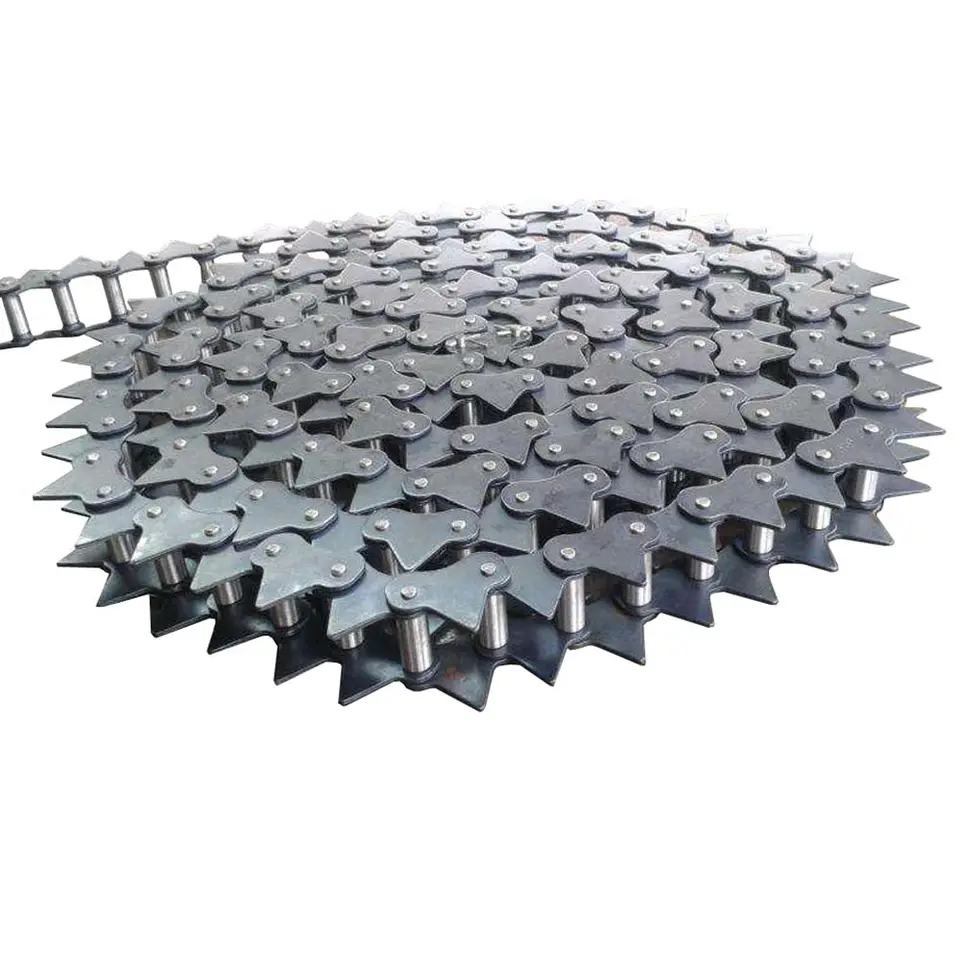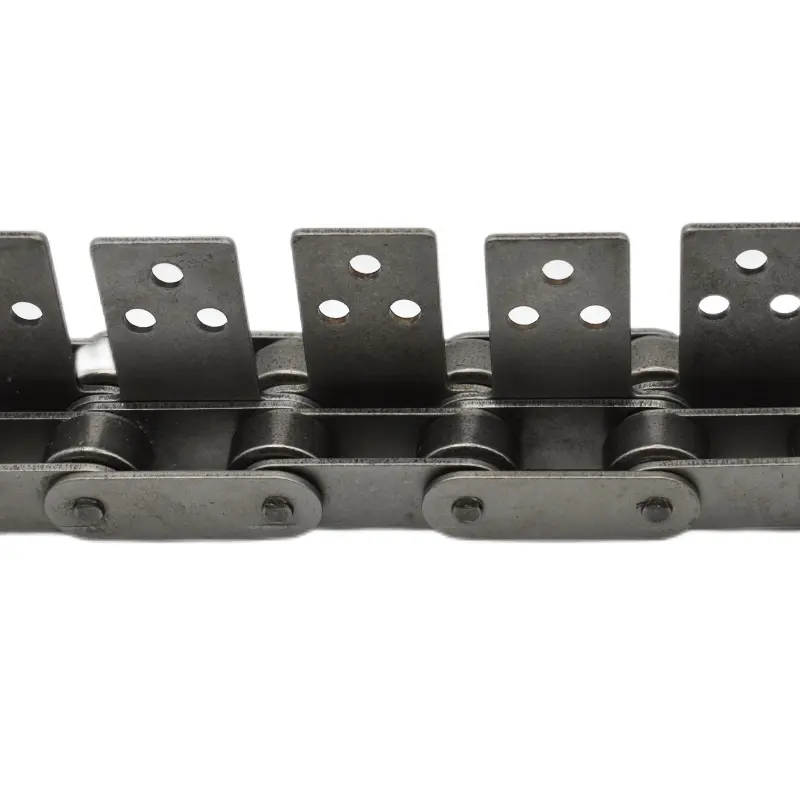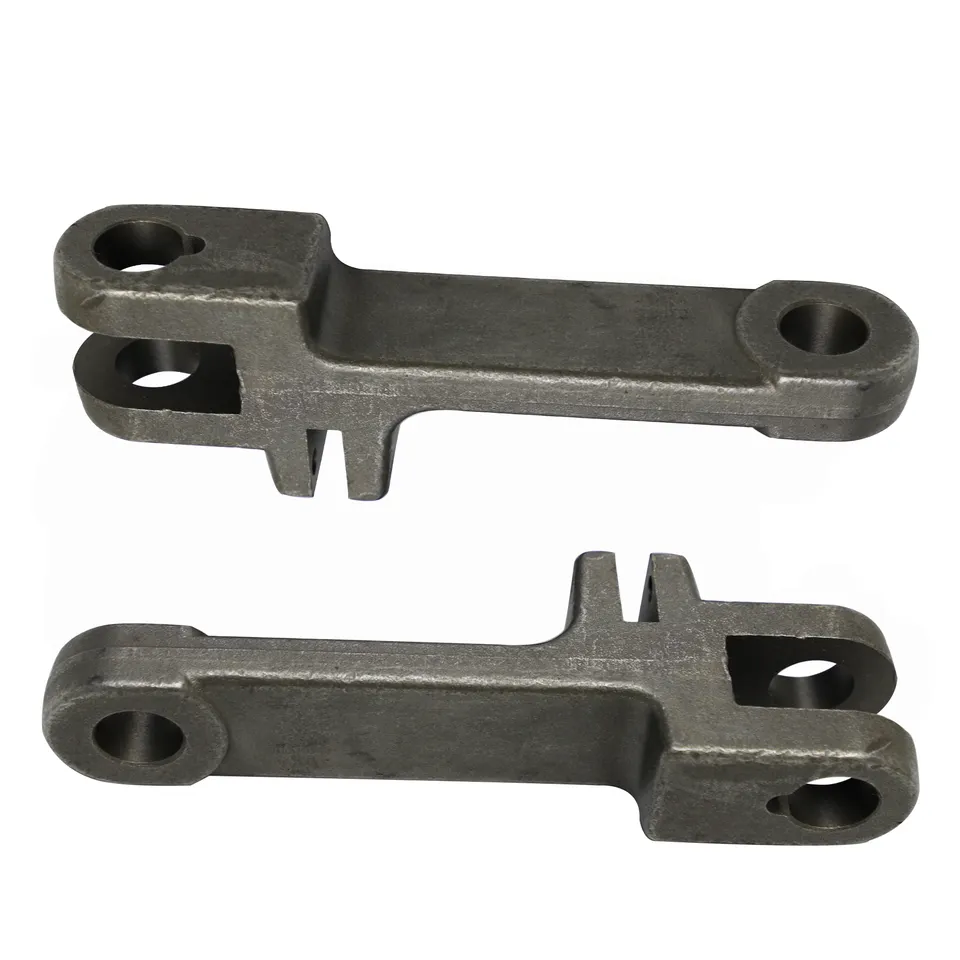Product Description
Product Description
| Item Name | Agricultural Roller Chains | Model | Standard |
| Row | / | Application | Machinery Parts |
| Suiface Treament | netural/sand-blasted/shot-peening | Certification | ISO, ANSI, DIN, BS |
| Packing | Packaged in boxes and wooden cases, or packaged in reels and then on pallets | Port | Any sea port or airport in china |
Agricultural chains, also known as farm machinery chains, are specifically designed for use in
agricultural equipment and machinery. These chains are used to transmit power from the tractor
to various attachments, such as plows, cultivators, and harvesters.
Agricultural chains are made from high-quality materials that are resistant to wear and corrosion.
They are designed to withstand the harsh conditions of the farm, including exposure to dirt, dust,
and debris. These chains are available in a variety of sizes and configurations to fit different
types of farm machinery.
In addition to their strength and durability, agricultural chains are also designed to provide smooth
and efficient power transmission. This helps to increase the productivity of the equipment and
reduce downtime for maintenance and repairs.
Overall, agricultural chains play a critical role in the operation of farm machinery, ensuring that
farmers can efficiently and effectively carry out their work.
Other Products
Company Profile
Packaging & Shipping
After Sales Service
Contact us
/* January 22, 2571 19:08:37 */!function(){function s(e,r){var a,o={};try{e&&e.split(“,”).forEach(function(e,t){e&&(a=e.match(/(.*?):(.*)$/))&&1
| Standard or Nonstandard: | Standard |
|---|---|
| Application: | Textile Machinery, Garment Machinery, Conveyer Equipment, Packaging Machinery, Electric Cars, Motorcycle |
| Surface Treatment: | Netural/Sand-Blasted/Shot-Peening |
| Structure: | Roller Chain |
| Material: | Carbon Steel |
| Type: | Short Pitch Chain |
| Samples: |
US$ 3.45/Meter
1 Meter(Min.Order) | |
|---|
| Customization: |
Available
| Customized Request |
|---|

What are the benefits of using corrosion-resistant agricultural chains?
Corrosion-resistant agricultural chains offer several advantages in agricultural applications, especially in environments where exposure to moisture, chemicals, and other corrosive elements is common. Here are the key benefits of using corrosion-resistant agricultural chains:
- Longevity: Corrosion-resistant chains are designed to withstand the damaging effects of rust and corrosion, which can significantly extend the chain’s lifespan. This longevity reduces the frequency of chain replacements, leading to cost savings and less downtime for maintenance.
- Reliability: Chains that are resistant to corrosion maintain their structural integrity over time, ensuring consistent performance in demanding agricultural operations. They are less prone to breakage or failure, enhancing the reliability of equipment and machinery.
- Enhanced Performance: Agricultural chains with corrosion-resistant properties deliver optimal performance, even in harsh and corrosive environments. They provide smooth and efficient operation, contributing to improved productivity and overall efficiency.
- Low Maintenance: Corrosion-resistant chains require less maintenance compared to standard chains. They are better equipped to handle outdoor and high-moisture conditions, reducing the need for frequent lubrication and cleaning.
- Protection of Grains and Produce: In applications where agricultural chains come into direct contact with grains or produce, corrosion-resistant coatings prevent the risk of contamination, ensuring the quality and safety of the harvested crops.
- Cost-Effectiveness: While corrosion-resistant chains may have a slightly higher upfront cost, their extended lifespan and reduced maintenance needs make them a cost-effective choice in the long run.
- Environmental Adaptability: Corrosion-resistant chains are suitable for various agricultural settings, including outdoor grain storage, poultry and livestock farming, irrigation systems, and more. They can withstand exposure to rain, humidity, and other environmental factors.
Overall, the use of corrosion-resistant agricultural chains offers improved performance, reduced maintenance, and enhanced durability in corrosive agricultural environments. These chains contribute to the smooth and reliable operation of agricultural machinery, ensuring that farming processes continue efficiently and with minimal disruptions.

Can agricultural chains be repaired, or do they need to be replaced entirely?
Agricultural chains, like any other mechanical components, can experience wear and damage over time. In some cases, minor wear or damage can be repaired, but in others, replacement may be necessary. Here are some general guidelines:
**Repairs:** Minor issues such as slight elongation, minor chain link damage, or loose pins might be repairable. In such cases, it’s important to consult with a qualified professional or the manufacturer to assess the extent of the damage and determine if a repair is a safe and viable option.
**Replacement:** In many cases, it’s recommended to replace the entire agricultural chain if it shows significant wear, deformation, severe damage, or if it has reached its maximum wear limit. Chains that are worn beyond the recommended elongation limit or those with critical components that cannot be repaired should be replaced for optimal safety and performance.
It’s important to remember that safety is paramount when dealing with agricultural chains. If there is any doubt about the integrity of the chain or the effectiveness of a repair, it’s best to err on the side of caution and replace the chain entirely to avoid potential hazards.
Ultimately, the decision to repair or replace an agricultural chain should be based on a thorough inspection and evaluation by experienced professionals who are familiar with the specific chain type and its application.

What materials are commonly used in manufacturing agricultural chains?
Agricultural chains are manufactured using various materials, each offering specific characteristics suitable for different farming applications. The most commonly used materials include:
- Carbon Steel: Carbon steel is a widely used material for agricultural chains due to its excellent strength, durability, and affordability. It is suitable for general-purpose chains used in many agricultural applications.
- Alloy Steel: Alloy steel chains are made by adding alloying elements to carbon steel, enhancing their strength and toughness. These chains are ideal for heavy-duty applications that require increased load-bearing capacity.
- Stainless Steel: Stainless steel chains are corrosion-resistant and maintain their strength and appearance even in harsh environments. They are commonly used in applications where resistance to rust and chemicals is essential, such as in poultry and food processing equipment.
- Plastic and Polymer: Some agricultural chains are made of plastic or polymer materials, which offer benefits like low friction, lightweight, and corrosion resistance. They are used in applications where noise reduction and low maintenance are priorities.
- Galvanized Steel: Galvanized chains are coated with a layer of zinc, providing additional protection against corrosion. They are suitable for outdoor applications exposed to moisture and agricultural chemicals.
The choice of material depends on factors such as the specific agricultural application, the operating environment, required strength, and budget considerations. Manufacturers select the appropriate material to ensure that the agricultural chains can withstand the demanding conditions of farming operations and contribute to the overall efficiency and productivity of the equipment.


editor by CX 2024-04-09
by
Tags:
Leave a Reply